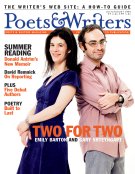Less than two years ago, the board of directors of the Feminist Press, the independent publisher of women's writing founded in 1970, voted not to renew the job contract of executive director Jean Casella, who had worked at the press for nine years. According to Casella, the board was "dissatisfied with my work as a fund-raiser, and felt that the press now needed someone with more experience in administration and financial management." In February, the board announced it had found that someone.

Gloria Jacobs has worked for years as a journalist covering women's issues and as an activist involved with women's organizations. A former editor of Ms., she has also worked at the United Nations, where she wrote and edited reports on the effects of war on women, gender discrimination, HIV, and other subjects. During her third month on the job, Jacobs spoke about her new position as executive director of the oldest independent publisher of women's writing in the world.
How important is fund-raising for a nonprofit like the Feminist Press?
Huge. Just huge. I remember thinking, when I was first being interviewed, that there must be some way to sell books in such a way that we don't have to rely on donations. But the more I look at it, the more I realize it's like a museum or dance or anything else—you sell tickets, you charge people to come in, but that can't begin to cover the cost of providing something that is essentially nonprofit. [These books are] not being produced in such a way that you get the most money, because that's when you're geared to creating best-sellers rather than creating books that are important or ensuring that important books stay in print. People call us all the time and say, "My book is going out of print by a mainstream publisher—would you be interested in it?" And we are interested in it; that's part of what we do. Because we don't have to look at the bottom line, it makes it possible for us to do that. But because we don't have to look at the bottom line, we have to raise money.
The press has had to evolve as other women's publishers have emerged over the years. How would you describe its current niche?
It's a work-in-progress, so to speak. We continue to feel that it's very important for us to find "lost women's voices," and as someone said the other day, "It's amazing how many women are still lost." At the same time, we've moved very strongly into publishing translations of important works from other countries. One of our next books, Touba and the Meaning of Night, is an Iranian book, banned in Iran. The author, Shahrnush Parsipur, has been imprisoned, both by the Shah and by the religious government—she's in exile now. And there's no one in the mainstream press at this point who would take on publishing a translation from Farsi of something that they didn't know was going to be a huge best-seller. That's very important for us. So we've become much more of an international press.
In what direction do you hope to lead the Feminist Press?
I want to expand the press's reach. I want to make sure that women don't feel intimidated or threatened by feminist literature. I want us to be, in a sense, a hub for up-to-date information about women around the world. I think it's very exciting to do that through writers. People are very interested to hear what writers have to say and are very moved by books. You know, being able to have a good read is one of the best ways to discover something about yourself and the world, rather than to be preached at.
Eleanor Henderson is a writer living outside Charlottesville, Virginia.








